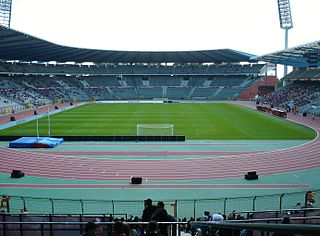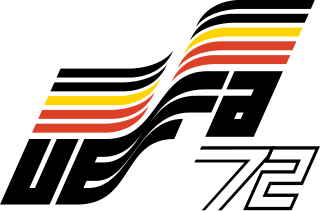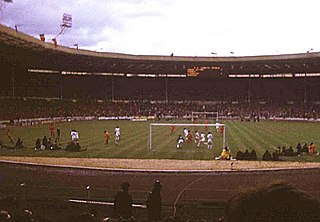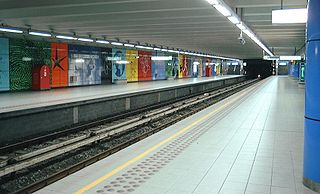The Heysel Stadium disaster was a crowd disaster that occurred on 29 May 1985 when mostly Juventus fans escaping from a breach by Liverpool fans were pressed against a collapsing wall in the Heysel Stadium in Brussels, Belgium, before the start of the 1985 European Cup Final between the Italian and English clubs. Thirty-nine people—mostly Italians and Juventus fans—were killed and 600 were injured in the confrontation.

The King Baudouin Stadium is a sports ground in Brussels, Belgium. Located in the north-western district of the City of Brussels, it was built to embellish the Heysel/Heizel Plateau in view of the 1935 Brussels International Exposition. It was inaugurated on 23 August 1930, with Crown Prince Leopold attending the opening ceremony. The stadium hosted 70,000 at the time. Its name honours King Baudouin, Leopold's successor as King of the Belgians from 1951 to his death in 1993.

Football was one of the 154 events at the 1920 Summer Olympics, held in Antwerp, Belgium. It was the fifth time association football was on the Olympic schedule. The tournament expanded to 15 countries, including a non-European nation (Egypt) for the first time.

The 2000 UEFA European Football Championship, also known as Euro 2000, was the 11th UEFA European Championship, a football tournament held every four years and organised by UEFA, the sport's governing body in Europe.

The 1972 UEFA European Football Championship final tournament was held in Belgium. This was the fourth UEFA European Championship, held every four years and endorsed by UEFA. The final tournament took place between 14 and 18 June 1972.

The Belgium national football team officially represents Belgium in men's international football since their maiden match in 1904. The squad is under the global jurisdiction of FIFA and is governed in Europe by UEFA—both of which were co-founded by the Belgian team's supervising body, the Royal Belgian Football Association. Periods of regular Belgian representation at the highest international level, from 1920 to 1938, from 1982 to 2002 and again from 2014 onwards, have alternated with mostly unsuccessful qualification rounds. Most of Belgium's home matches are played at the King Baudouin Stadium in Brussels.

The Belgian Cup is the main knockout football competition in Belgium, run by the Royal Belgian FA. The competition started in 1908 with provincial selections as the "Belgian Provinces Cup". Starting from 1912 only actual clubs were allowed to partake. As of 1964, the Belgian Cup has been organised annually. Since the 2015–16 edition, the Belgian Cup is called the Croky Cup, for sponsorship purposes. The final traditionally takes place at the Heysel Stadium in Brussels.

The 1962–63 European Cup was the eighth season of the European Cup, a football competition for European clubs. The competition was won by Milan, who beat two-time defending champions Benfica in the final at Wembley Stadium in London. Milan's victory was the first by an Italian club.

Heysel (French) or Heizel (Dutch) is a Brussels Metro station on line 6. It is located in Laeken, in the north-west of the City of Brussels, Belgium, and serves the Heysel/Heizel Plateau, famous for the World's Fairs of 1935 and 1958, the King Baudouin Stadium and the Atomium. The Bruparck entertainment park and the Centenary Palace, home to the Brussels Exhibition Centre, are also located nearby.
The qualification for the 1984 European Competition for Women's Football was held between 18 August 1982 and 28 October 1983.

The 1985 European Cup final was an association football match between Liverpool of England and Juventus of Italy on 29 May 1985 at the Heysel Stadium, Brussels, Belgium. It was the final match of the 1984–85 season of the European Cup, Europe's premier cup competition. Liverpool were the reigning champions and were appearing in their fifth final, having won the competition in 1977, 1978, 1981 and 1984. Juventus were appearing in their third European Cup final; they lost both of their previous appearances in 1973 and 1983.

The 1996 UEFA Cup Winners' Cup final was a football match contested between Paris Saint-Germain of France and Rapid Wien of Austria. It was the final match of the 1995–96 UEFA Cup Winners' Cup and the 36th Cup Winners' Cup final. The final was held at King Baudouin Stadium in Brussels on 8 May 1996, hosting its first European club final since the scenes of the Heysel Stadium disaster eleven years prior. Paris Saint-Germain won the match 1–0, thanks to a free kick from Bruno Ngotty.

The 1958 European Cup final was a football match which took place at Heysel Stadium in Brussels, Belgium, on 28 May 1958. It was contested by Real Madrid of Spain and AC Milan of Italy. Real Madrid won 3–2 after extra time to claim their third European Cup in a row.
Group B of UEFA Euro 2000 began on 10 June and ended on 19 June 2000. Italy won the group ahead of Turkey. Belgium and Sweden were eliminated.
Standings and results for Group 1 of the UEFA Euro 1984 qualifying tournament.

The 2014 FIFA World Cup Brazil qualification UEFA Group A was a UEFA qualifying group for the 2014 FIFA World Cup. The group comprised Belgium, Croatia, North Macedonia, Scotland, Serbia and Wales.
The qualification for the 2014 UEFA Women's Under-19 Championship were a series of association football matches between national teams to determine the participants of the 2014 Final Tournament held in Norway.
Italy have participated in ten UEFA European Championships, and reached the final on four occasions. They became European champions at home in 1968, the first European Championship they qualified for, and finished as runners-up in 2000 and 2012, before winning their second continental championship at Euro 2020.
Eurostadium was a proposed stadium in Grimbergen, Belgium, just north of Brussels. It would have had a capacity of 62,613. In June 2015, the building deadline was set for 2019. It would have hosted matches for UEFA Euro 2020, and would have become the home ground of the national football team of Belgium.
The history of the Belgium national football team officially dates back to their first international in 1904. The Royal Belgian Football Association, which governs the team, co-founded the international governing bodies FIFA and UEFA. As of October 2015, Belgium qualified for 12 FIFA World Cups and 5 UEFA European Championships. In the periods 1920–1938, 1970–2002 and since 2014 Belgium participated in many international tournaments, including three Olympic football tournaments in the 1920s. So far, the national side is considered to have had two golden generations: one in the 1980s and early 1990s, and one since the early 2010s.












